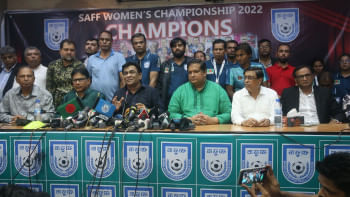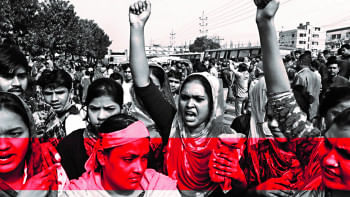Too unsafe to even play football?

When I was a little girl, the only female athletes whose names I knew were Serena and Venus Williams. I wasn't a tennis fan though. I was mad about cricket, especially the Sri Lankan team, and I could tell you what I loved about Ranatunga, Jayasuriya and Chaminda Vaas even before I properly knew how to spell their names.
At that point, if anyone had asked me if I thought women played cricket or football, I would probably have instinctively said no. My school only reinforced this belief, taking out the boys in our class in buses every week to play football and cricket on open fields, while the girls had to do with the small courts within campus walls. It's not that they didn't think we were capable though, they were only protecting us from the lack of safety that they seemed fine subjecting the boys to.
You can only imagine how much pride it gives me now to know that even if the Asia Cup title continues to elude the Bangladesh men's cricket team – who by the way have had my undying fidelity since that fateful day in Northampton in 1999 (if you know, you know) – the Bangladesh women's team, despite having far less experience under their belt, beat six-time champion India in 2018 to clinch the title. Most recently, the Tigresses held their own in their first-ever home series as well, with a 1-1 series draw against India.
As a child, I don't think I imagined that one day, images of Bangladesh's women cricketers and footballers would be on the front pages of major local newspapers like they were after the 2018 Women's T20 Asia Cup, and after the Bangladesh team's dramatic win in the 2022 SAFF Women's Championship. I definitely could not have imagined the hero's welcome our footballers would return to after winning the SAFF trophy, with crowds of people, men and women, pouring out onto the streets to cheer them on. Whether it's weight lifting, mountain climbing or archery, today's little girls have so many more role models to look up to that it's impossible to not feel hopeful about how far Bangladeshi women have come in the last couple of decades.
The media is so saturated with horrific cases of rape and violence that the regular abuse, harassment and threats women face for simply daring to inhabit public spaces barely make it into the conversation. Too often, their experiences are trivialised and ignored: by families, communities, law enforcement agencies and the justice system. But the truth is that the rosy picture of Bangladeshi women's achievements has always masked a darker underbelly: whether it is of greater financial insecurity, social stigma, lack of support, or being undermined and underestimated at every turn.
This is why it's all the more difficult to be shocked back to reality by the attack on four members of the under-17 Khulna divisional football team on July 29 in Khulna's Batiaghata upazila. According to media reports, not only were these young girls assaulted simply for wearing sports attire and practising football; they were then threatened with acid attacks if they refused to withdraw the case they had filed against their attackers.
Unfortunately, and as we are all aware, such gender-based violence is an everyday reality in Bangladesh. The media is so saturated with horrific cases of rape and violence that the regular abuse, harassment and threats women face for simply daring to inhabit public spaces barely make it into the conversation. Too often, their experiences are trivialised and ignored: by families, communities, law enforcement agencies and the justice system. But the truth is that the rosy picture of Bangladeshi women's achievements has always masked a darker underbelly: whether it is of greater financial insecurity, social stigma, lack of support, or being undermined and underestimated at every turn.
And this is all the more pertinent when it comes to women's sports. In fact, I doubt we would be able to find even a single female athlete in the country who has not, at some point in her journey, faced criticism, threats or even verbal/physical abuse for her chosen profession.
The fact that female athletes have a harder time of it than men is hardly new information. The ongoing Fifa Women's World Cup, where viewership is expected to hit over two billion for the first time, has once again shone a spotlight on the inequalities and difficulties faced by female athletes. Jamaica made history by becoming the first Caribbean country to reach the final 16. Despite having so little financial backing, they needed crowd-funding to get to their games. Morocco also made history by reaching the top 16 in their first-ever World Cup appearance, and their players spoke to the media about the social stigma they faced at home for wearing "men's clothing" and playing football. At the same time, Moroccan defender Nouhaila Benzina became the first player to wear a hijab at a World Cup, proving that diversity and representation can exist not only on the same field but even in the same team. In a world where everyone else seems to be taking a step forward, why does it feel like we're not only failing to keep up but taking a step back instead?
After England won the UEFA European Women's Championships, I remember watching their captain Leah Williamson speak of England's 50-year ban on women's football in an interview, and how her mother pretended to be a boy so she could play when she was young. Thankfully, this was one regressive colonial law that never managed to seep into our system, but the same patriarchal views of a woman's "place" in society continue to guide attacks like the one in Batiaghata.
If the relevant authorities fail to bring the perpetrators to justice, it will only highlight the incongruity of our situation in terms of equal rights and freedom. In a country as football-crazy as Bangladesh, can "playing football" really become part of the ever-growing list of reasons women face gender-based violence? In a place where women occupy some of the highest positions in office, and where women's involvement in economic development has been so widely lauded, why should the most ordinary activity that every young person should have access to become a test of courage and act of rebellion?
Shuprova Tasneem is a journalist. Her Twitter handle is @ShuprovaTasneem

 For all latest news, follow The Daily Star's Google News channel.
For all latest news, follow The Daily Star's Google News channel. 









Comments